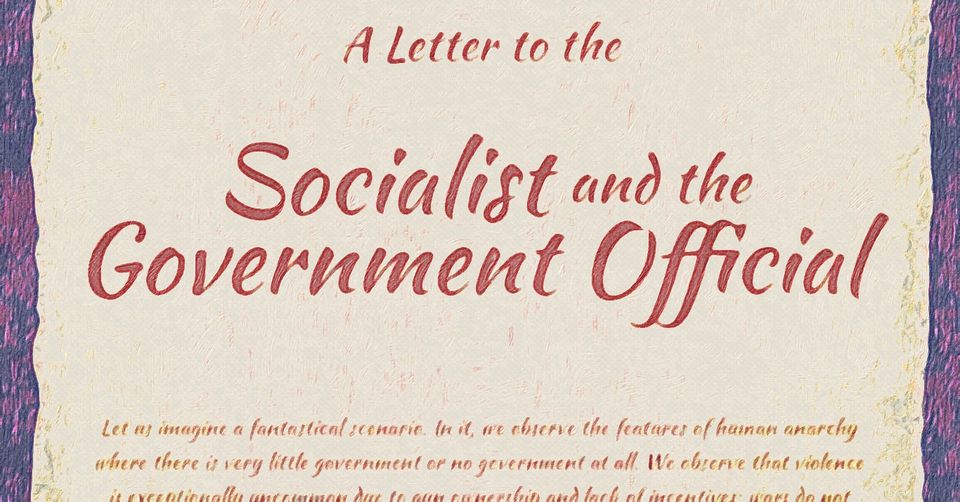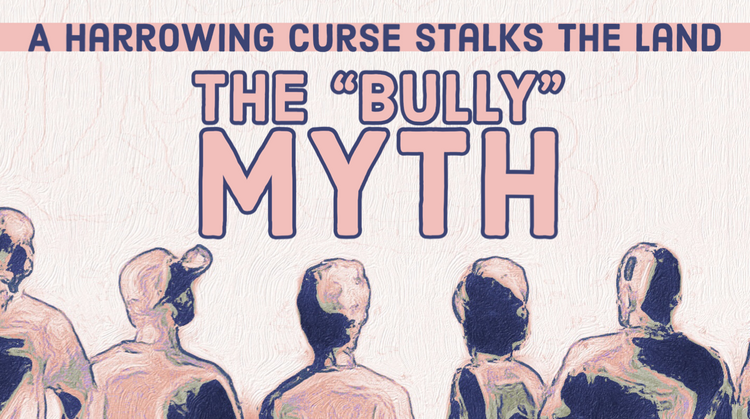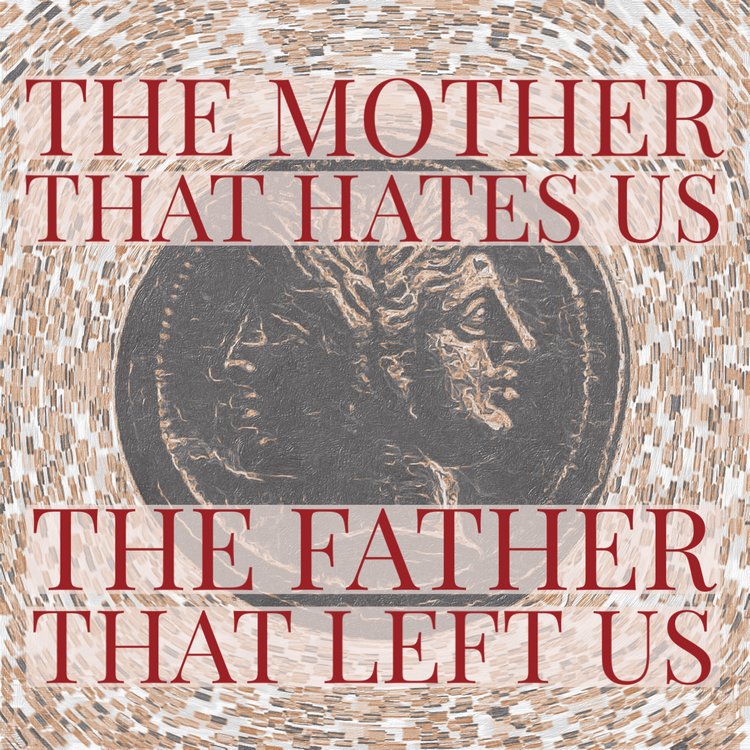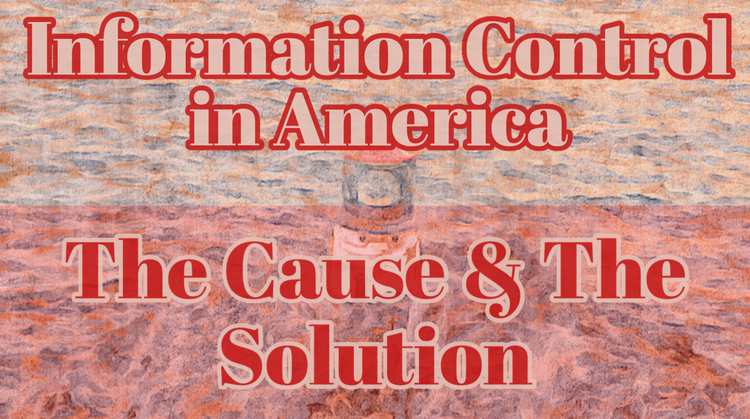A Letter to the Socialist & the Government Official

Let us assume a fantastical scenario. The purpose of this thought experiment is to pose a question to the socialist and the government official.
We observe the features of human anarchy where there is very little government or no government at all. In this scenario, we observe that violence is exceptionally uncommon; wars do not exist at all; theft is a rare event; and the average living standard is rising faster than any other system. To summarize, anarchist society is prosperous, safe, and comparatively free of coercion and theft. The only thing lacking is de facto equality (equality of outcome).
To the socialist and the government official, if these observations were true, would you still not want this society? Would you still want de facto equality even if we already had authority equality (anarchy), legal equality (fairness), lethality equality (due to real/potential gun ownership), equality of opportunity, and maximal freedom?
For the socialists and government officials that answered yes, I still want de facto equality, then this essay will not overcome the insurmountable barrier that is your control complex. Despite every important metric for health and happiness (opportunity, fairness, prosperity, safety, freedom from coercion and theft), you cannot claim that equality of outcome is more important to the health and interests of humanity at the cost of such things.
For the more inquisitive and less authoritarian, please consider my following arguments.
Is it an Order Complex or a Control Complex?
Historically, any given society has had more than one money at any single point in time. A money is a commodity that is used as a medium for exchange.
For instance, the use of gold and silver simultaneously is a common example of two moneys in competition with one another. Each has a "price" in terms of the other – an exchange rate. For instance, a gram of gold might be worth 15 grams of silver (or vice versa, a gram of silver is worth 0.07 grams of gold). In this scenario, the exchange rate is 1:15.
Each also has a "price" in terms of the goods that they can be exchanged for – purchasing power. If a gram of gold purchases 15 steaks, then 1 gram of silver would purchase 1 steak. This is the "purchasing power" of each money. The ratio of their purchasing powers (1 steak / 15 steaks) should reflect their exchange rates. If the two do not reflect one another, then people will exchange the money with the lower purchasing power with the money with the higher purchasing power until the exchange rates and the relative purchasing powers equalize.
Due to natural human action, the exchange rates (x:y) of different moneys will tend to reflect the relative purchasing power of the moneys. This is order from chaos. No government planning – no force or coercion is required, yet government have a history of fixing the price of one money to the other. Government has a history of forcibly setting prices for many commodities, not just moneys. Why? If order (and its close relative, security) occur spontaneously on the free market, then the only reason the government official would want to enact price controls is for personal gain.
The production process is also order from chaos. In the free-market production process, an entrepreneur, say an investor looking to build a hotel, invests money in a complicated process that will not reward him until it is completed (if he is correct to take the risk). In this setting, there are hundreds of workers and perhaps dozens of independent companies involved in the planning and construction of the hotel. There are the crews that clear the land, that prepare the foundation, that build the forms for the concrete, electricians, plumbing crews, framing carpenters, finish carpenters, glass installers, and much more. None of these people have to wait for the project to complete in order to be paid because the entrepreneur assumes all of the risk and pays them throughout the duration of the build. This is but one example of many where a complex production process exists from chaos – from people choosing to sell their labor and talents with others in a system of free exchange.
Clearly the socialist and government official does not feel some inherent need to impose order on their society because the most prosperous and elegant social orders exist free of government intervention. Despite the prosperous nature of the free market and individuals freely pursuing their interests, the socialist characterizes it as an irreconcilable conflict of interests. What rationalism could possibly lead to this conclusion? And if rationalism for it does not exist, what empirical observation could lead to this conclusion?
Prosperity and Ingenuity
Free individuals pursue their own interests, and to engage in transactions with other free individuals, they have to benefit each other's interests. As such, the most prosperous individuals tend to also be the individuals that help others the most. They must be able to calculate profits and loss, which is the only accurate and quick test to determine of one is benefiting himself and others.
And businessmen's calculations are all based on the fact that, in the market economy, the money prices of goods inform not only the consumer; they also provide vital information to businessmen about the factors of production, the main function of the market being not merely to determine the cost of the last part of the process of production and transfer of goods to the hands of the consumer, but the cost of those steps leading up to it. The whole market system is bound up with the fact that there is a mentally calculated division of labor between the various businessmen who vie with each other in bidding for the factors of production — the raw materials, the machines, the instruments — and for the human factor of production, the wages paid to labor. This sort of calculation by the businessman cannot be accomplished in the absence of prices supplied by the market. 1
Mises missed an important point in his deductions though. When the businessman reduces prices with the principle of marginal utility (using a factor of production more efficiently or more efficiently acquiring a factor of production), he makes many other industries more efficient. Other markets that are not even in competition with him but use a similar factor of production will utilize his discovery and be able to lower their prices as well.
Furthermore, a more efficient use of resources does not only lower prices, but it makes the businessman's services or goods more accessible. This is how the living standard is raised in society – by making services more accessible to more people. More money supply does not create more prosperity because money is not a service. More money supply simply dilutes the purchasing power of money for services.
The economic actor creates prosperity. The government official does not.
At the very instant you abolish the market — which is what the socialists would like to do — you render useless all the computations and calculations of the engineers and technologists. The technologists can give you a great number of projects which, from the point of view of the natural sciences, are equally feasible, but it takes the market — based calculations of the businessman — to make clear which of those projects is the most advantageous, from the economic point of view. 1
But What About the Poor?
The 3 ways government "helps" the poor:
I. Redistribution:
Taking from someone by force to give to someone else cannot be the way in which the poor are helped. As Friedrich A. Hayek famously said,
the means by which the state redistributes the wealth to make a society more egalitarian, are the same methods by which a tyrant would benefit a racial elite 2
II. Lowering Prices:
First, this creates a shortage in the product in question since people can buy more of it. The supply and demand are disrupted by force of government. Secondly, investment in this product decreases since it is less valuable, and businesses will produce less of it. This results in further shortages of the product.
Tangentially, government raises wages (which in theory, should lower the relative prices of goods). Unfortunately, policies that raise the minimum wage have a net negative effect on the group of people that are meant to benefit from these policies.
III. State Services:
The premise of state services (like public schools) is that not every person can afford certain things on the market, so the state should provide those services. The issue is that the state does not have to acquire its consumers – consumers are born into the role of a coerced consumer that has to pay for state services. The consumer does not have the freedom to contract or not contract for such "services". This is why the government does not have to perform jobs well because it does not have to satisfy the needs of a consumer.
A market service does, however. A market service has to compete with other market services, and the service that tends to satisfy consumer's needs most will acquire those consumers. This happens by ingenuity – (1) finding ways of decreasing prices so that more consumers can pay for these services; (2) and by making a better service than competitors. Neither outcome is possible with government programs since they do not have to compete and do not have to acquire consumers. In fact, when a government program fails, the goal is not to decrease the "price" of the program but to expand it (take more from subjects – taxes).
Governments inherit subjects. Businesses acquire consumers.
The subject is not nearly as influential of his government as the consumer is over his market.
Is a Little Bit of State Intervention Acceptable?
State intervention is classified as a combination of the 3 ways government "helps" highlighted above. It has a terrible historical record, but for conciseness, let us examine a recent example.
The public has become quite dissatisfied with the major tech platforms – Facebook, Google Search, Instagram, Twitter, Bing Search, and others. A dissatisfied consumer may ask, if all of the censorship and propaganda is being carried out by private companies, then should we not have state intervention to help free networks from oppression?
I would first respond with: how do you know if the control of information is not caused by state intervention already?
The entrepreneur, like any free individual, needs to help others achieve their own ends in order to achieve his own. He cannot do this by forcing an unwanted service onto the consumer. That is, unless he has become an unelected member of the state.
If he receives privileges, such as tax money, then he can continue his services without fear of failure because his services no longer require him to satisfy the needs of consumers. If furthermore, the state is using its power to exclude his competitors, then any demand for his services will have to use him specifically! To an extent, this is what has occurred with the massive censorship, propaganda, and slander campaigns online – the state promised a large sum of money to entrepreneurs to carry out a these specific tasks, while also using its "credentials" to slander the non-participating competitors (Parlor, Gab, etc) as "extremists". The state promised security for individuals that wished to do things (censor, disseminate propaganda, and control networks) that other individuals would punish them for on an actual free market. Had the state not been involved, we would not have massive information control online.
Finally, if rational arguments and current empirical observations do not suffice, perhaps empirical observations of past intervention in a similar market will convince a reader that state intervention leads to strict control of information that solely benefits the state.
The entrepreneur that accepts state privileges should be held accountable for taking the easy way out; for choosing to participate in coercion of people by the state. However, it would be folly to characterize this person as the root of the problem when the state is the actual cause of oppression.
But it is Unsafe!
Perhaps it is true that human society is unsafe, but a free-market society is safer than any existing or past system. The free market relieves risks as much as can possibly be done. First, this is done by savings of either a cash balance or an investment in production. Secondly, this is done by entrepreneurship, which is simply a way for risk takers to finance complex production processes by assuming all of the risk and relieving laborers of risk by paying them wages. As Mises put it,
Imagine the universal risk if laborers could not be paid until the final product reached the consumers! 3p. 1313
The capitalist-entrepreneur adopts the burden of waiting for a process to end before reaping the rewards (which may not come if he was wrong to take the risk).
The free market also minimizes risks and insecurity with insurance. Insurance is a rather natural human phenomenon where a group pools resources to minimize risks of individuals within the group. Those that pay their fair share into the program may lead happy lives without tragedy; and if that is the case, then these people paid for relief that only other people "enjoy". By "enjoy", I mean that those that had suffered some hardship that the insurance program provided security for receive benefits that the group pays. Thus, the investor in insurance receives recompense for his investment if something bad befalls him but pays for the recompense of others who suffer tragedy.
Lastly, the free market minimizes risk with voluntary charity. Charity is directly proportional to the prosperity of the markets since it has to come from the production of the markets. The state cannot provide charity because the state does not produce anything. It simply takes the production of the market and redistributes it, ultimately causing a net decrease to prosperity. By every significant metric, voluntary charity is superior to the welfare state. 4
As for crime, societies have different amounts of freedom. We can plot the different amounts of freedom and the corresponding crime index of each. We can measure that crime decreases as a society's freedom increases. 5
What About Law and Morality?
See Fuller 6 and The Fabric of Economics for descriptions of reasonable (and innate) human morality, how that morality leads to legal systems, and how only the free-market is compatible with human morality.
Dear Socialist and Government Official,
Characterizing this essay as a theory of a perfect society is not a valid criticism because I am not proposing such a theory. I am simply proving that a free-market society is more safe; more prosperous; better for the poor; and of course, far freer than any solutions proposed by you. Ultimately, no other system can result in accurate market calculation because no other system develops prices for all the production factors that lead up to a consumer's good. As such, the government official cannot make sound calculations – only the free economic trader can. It has been established for well over a century that such a price-finding-mechanism naturally exists in a free market, and it has been well over a century that the socialist and the government official has failed to address this discovery and their own ineptness at making comparable calculations.
I began by hypothesizing a "fantastical scenario", but it would seem that the benefit of human chaos is not quite "fantastical" at all. Unless I have made an error, the socialist or government official that remains true to his original position after having read this is merely an unscrupulous person that wants to benefit from society's riches without reciprocating anything in return – the socialist and government official want control.
[1] Ludwig Von Mises. "Socialism." Mises Institute.
[2] Friedrich A. Hayak. "The Road to Serfdom."
[3] Ludwig Von Mises. "Man, Economy, and State | With Power and Markets."
[4] David T. Beito. "From Mutual Aid to the Welfare State | Fraternal Societies and Social Services, 1890–1967."
[5] Kelly C. Offield. "The Nature of Crime and Liberty." The ARKA Journal.
[6] Lon L. Fuller. "The Morality of Law."

![A Religion Called "Psychology" & the Bully Myth [Part II]](/content/images/size/w750/2022/10/bully2.PNG)




Member discussion